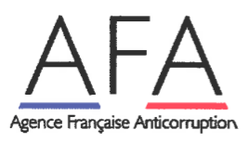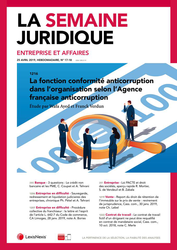Thesaurus : Doctrine

► Full Reference: Segonds, M., Compliance, Proportionality and Sanction. The example of the sanctions taken by the French Anticorruption Agency, in Frison-Roche, M.-A. (ed.),Compliance Monumental Goals, series "Compliance & Regulation", Journal of Regulation & Compliance (JoRC) and Bruylant, to be published.
___
► Article Summary: Before devoting the developments of his article to the sole perspective of sanctions imposed under "Anti-corruption Compliance", the author recalls in a more general way that, as is the sanction, Compliance is in essence proportional: Proportionality is inherent to Compliance as it conditions any sanction, including a sanction imposed under Compliance.
This link between Proportionality and Compliance has been underlined by the French Anti-Corruption Agency (Agence française anticorruption - AFA) with regard to risk mapping, which must measure risks to arrive at effective and proportional measures. This same spirit of proportionality animates the recommendations of the AFA which are intended to apply according to the size of the company and its concrete organisation. It governs sanctions even more, in that punitive sanctions refer on one hand to Criminal Law, centered on the requirement of proportionality. Punitive sanctions It governs sanctions even more, in that punitive sanctions refer on the other hand to the disciplinary power of the manager who, from other sources of law, must integrate the legal requirement of proportionality when he/she applies external and internal compliance norms.
____
_______
Jan. 17, 2024
Thesaurus : Doctrine

► Référence complète : E. Russo, "L’enquête interne au cœur des enjeux de conformité et de justice négociée : analyse de la position de l'AFA et du PNF", in M.-A. Frison-Roche et M. Boissavy (dir.), Compliance et droits de la défense. Enquête interne – CJIP – CRPC, Journal of Regulation & Compliance (JoRC) et Dalloz, coll. "Régulations & Compliance", à paraître.
____
📕consulter une présentation générale de l'ouvrage, Compliance et droits de la défense - Enquête interne, CIIP, CRPC, dans lequel cet article est publié
____
► Résumé de l'article (fait par le Journal of Regulation & Compliance - JoRC) : L'auteur reprend et s'appuie sur les publications par le Parquet national financier (PNF) et l’Agence Française Anticorruption (AFA) de lignes directrices actualisées sur la Convention judiciaire d’intérêt public CJIP et d’un guide pratique sur l’enquête interne, montrant le continuum entre les deux et manifestant une volonté de collaboration avec les entreprises, dans un contexte international et sur un modèle anglo-saxon.
L'auteur souligne que l'enquête est au cœur de la conformité pour les entreprises, en ce qu'elle permet l'efficacité de nombreuses exigences de la loi dite "Sapin 2", comme l'alerte, et permet de renforcer l'ensemble. Concernant les droits de la défense, aussi bien ceux des personnes auditionnées que ceux de l'entreprise, laquelle ne devant pas rester passive, l'auteur souligne que le législateur pourrait encadrer davantage l'enquête interne et estime que lorsque l'enquête prend une certaine proportion, l'entreprise a intérêt à en confier la conduite à un avocat. Plus encore, il prend nettement parti pour le cumul souhaitable par l'avocat de la fonction d'enquêteur et la fonction de défenseur de l'entreprise, contrairement à la recommandation de l'AFA et du PNF d'y voir une incompatibilité.
____
🦉Cet article est accessible en texte intégral pour les personnes inscrites aux enseignements de la Professeure Marie-Anne Frison-Roche
________
May 11, 2023
Thesaurus : Soft Law
► Full Reference : Agence française anticorruption - AFA (French Anticoruption Agency), Presentation of various regulatory frameworks for promoting business integrity across the world, Study, May 2023.
____
________
March 14, 2023
Thesaurus : Soft Law
► Full Reference: Agence française anticorruption - AFA (French Anti-Corruption Agency) and Parquet national financier - PNF (French National Financial Prosecutor's Office), Internal anti-corruption investigations. Practical Guide, march 2023.
____
________
Feb. 2, 2023
Thesaurus : Doctrine

► Full Reference: S. Scemla and D. Paillot, "La difficile appréhension des droits de la défense par les autorités de contrôle en matière de compliance" ("The supervisory authorities face difficulties to apprehend the rights of the defence in Compliance matters"), in M.-A. Frison-Roche (ed.), La juridictionnalisation de la Compliance, coll. "Régulations & Compliance", Journal of Regulation & Compliance (JoRC) and Dalloz, 2023, p. 241-249.
____
📕read a general presentation of the book, La juridictionnalisation de la Compliance, in which this article is published
____
► Summary of the article (done by the authors): Since 2016, French companies subject to the provisions of the so-called “Sapin 2” Law must implement eight stringent anti-corruption measures, such as a risk mapping, a whistleblowing procedure or a third-party due diligence procedure.
To ensure their compliance with these obligations, the Sapin 2 law created the Agence française anticorruption - AFA (French Anti-Corruption Agency), which had been assigned three missions: firstly, to help any person prevent and detect corruption; secondly, to control the quality and effectiveness of the anti-corruption programs deployed by the companies; and thirdly, to sanction any breaches, through its Sanctions Committee.
As pointed out by the French Conseil d’Etat, the powers devolved to the administrations have multiplied and became stratified. While the Conseil d'Etat suggests to improve both the conduct and the effectiveness of administrative controls by harmonising their practices and simplifying their prerogatives, it is urgent to remedy the numerous procedural failures that undermine the rights of defence.
In fact, the AFA exercises various powers when undertaking its controls. Some of these powers are not provided for by the Law, and most of them infringe fundamental rights and freedoms among which the adversarial principle and the freedom not to self-incriminate. For instance, the AFA does not necessarily draft minutes of the interviews it conducts, thus depriving the interviewee of the possibility to challenge the statements reported by the AFA to the Sanctions Committee.
From a more structural point of view, the scope of the AFA's mission is extremely broad. The Law allows the AFA to request the communication of "any professional document or any useful information", without defining the notion of usefulness. Also, the AFA considers that the entity cannot benefit from the legal privilege that would cover their documents, and considers that an entity who voluntarily hands over a document, without expressing any reserves, waives its right to the benefit of its legal privilege.
Apart from the severe consequences that could arise if another proceedings was to be initiated by a foreign authority, the concept of "voluntary handover" does not faithfully reflect the reality. Indeed, the controlled entities only cooperate under the threat of being prosecuted on the basis of an obstruction to the control, which compels them to communicate documents even when facing the risk of contributing to their own incrimination.
These many procedural deficiencies encountered during AFA controls must therefore be reformed, as recommended by the Conseil d’Etat, so as to require the authorities to take into account the rights of the defence.
________
Updated: Feb. 2, 2023 (Initial publication: June 23, 2021)
Thesaurus : Doctrine

► Full Reference: Ch. Lapp, "La compliance dans l'entreprise : les statuts du process" ("Compliance in the company: the statues of processes"), in M.-A. Frison-Roche (ed.), La juridictionnalisation de la Compliance, coll. "Régulations & Compliance", Journal of Regulation & Compliance (JoRC) and Dalloz, 2023, p.141-150.
____
📕read a general presentation of the book, La juridictionnalisation de la Compliance, in which this article is published
____
► The summary below describes an article following the colloquium L'entreprise instituée Juge et Procureur d'elle-même par le Droit de la Compliance (The Entreprise instituted Judge and Prosecutor of itself by Compliance Law) , co-organized by the Journal of Regulation & Compliance (JoRC) and the Faculté de Droit Lyon 3. This manifestation was designed under the scientific direction of Marie-Anne Frison-Roche and Jean-Christophe Roda and took place in Lyon on June 23, 2021. During this colloquium, the intervention was shared with Jan-Marc Coulon, who is also a contributor in the book (see the summary of the Jean-Marc Coulon's Article).
In the book, the article will be published in Title I, devoted to: L'entreprise instituée Juge et Procureur d'elle-même par le Droit de la Compliance (The Entreprise instituted Judge and Prosecutor of itself by Compliance Law ).
____
► Summary of the article (done by the author): The Company is caught in the grip of Compliance Law, the jaws of which are those of Incitement (1) and Sanction that the Company must apply to ensure the effectiveness of its processes to which it is itself subject (2 ).
First, the Company has been delegated to fabricate reprehensible rules that it must apply to itself and to third parties with whom it has dealings. To this end, the Company sets up "processes", that is to say verification and prevention procedures, in order to show that the offenses that it is likely to commit will not happened.
These processes constitute standards of behavior to prevent and avoid that the facts constituting the infringements are not themselves carried out. They are thus one of the elements of Civil Liability Law in its preventive or restorative purposes.
Second, the sanction of non obedience of Compliance processes puts the Company in front of two pitfalls. The first dimension place the company, with regard to its employees and its partners, in the obligation to define processes which also constitute the quasi-jurisdictional resolution of their non-compliance, the company having to reconcile the sanction it pronounces with the fundamental principles of classical Criminal Law, constitutional principles and all fundamental rights. The processes then become the procedural rule.
The second dimension is that the Company is accountable for the effectiveness of the avoidance by its processes of facts constituting infringements. By a reversal of the burden of proof, the Company is then required to prove that its processes are efficient. at least equivalent to the measures defined by laws and regulations, the French Anti-Corruption Agency (Agence Française Anticorruption - AFA), European directives and various communications on legal tools to fight breaches of probity, environmental attacks and current societal concerns. The processes then become the constitutive element, per se, of the infringement.
Thus, in its search for a balance between Prevention and Sanction to which it is itself subject, the Company will not then be tempted to favor the orthodoxy of its processes over the expectations of the Agence Française Anticorruption - AFA , regulators and judges, to the detriment of their efficiency?
In doing so, are we not moving towards an instrumental and conformist Compliance, paradoxically disempowering with regard to the Compliance Monumental Goals of Compliance?
________
Oct. 12, 2022
Thesaurus
Référence complète : Jaune, R., Règles pénales et administratives de la lutte anticorruption : l'influence des normes étrangères et internationales, Revue française d'administration publique, 2020/3, n°175, p.645-659.
____
Sept. 1, 2022
Thesaurus : Doctrine

► Référence complète : M. Segonds, "Compliance, proportionnalité et sanction" ("Compliance, proportionality and sanction"), in M.-A. Frison-Roche (ed.), Les Buts Monumentaux de la Compliance, coll. "Régulations & Compliance", Journal of Regulation & Compliance (JoRC) and Dalloz, 2022, p. 231-244.
____
📕read a general presentation of the book, Les Buts Monumentaux de la Compliance, in which this article is published
____
► Summary of the article (done by the Journal of Regulation & Compliance): Before devoting the developments of his article to the sole perspective of sanctions imposed under "Anti-corruption Compliance", the author recalls in a more general way that, as is the sanction, Compliance is in essence proportional: Proportionality is inherent to Compliance as it conditions any sanction, including a sanction imposed under Compliance.
This link between Proportionality and Compliance has been underlined by the French Anti-Corruption Agency (Agence française anticorruption - AFA) with regard to risk mapping, which must measure risks to arrive at effective and proportional measures. This same spirit of proportionality animates the recommendations of the AFA which are intended to apply according to the size of the company and its concrete organisation. It governs sanctions even more, in that punitive sanctions refer on one hand to Criminal Law, centered on the requirement of proportionality. Punitive sanctions It governs sanctions even more, in that punitive sanctions refer on the other hand to the disciplinary power of the manager who, from other sources of law, must integrate the legal requirement of proportionality when he/she applies external and internal compliance norms.
________
Sept. 23, 2021
Thesaurus : Doctrine

► Full Reference: S. Scemla & D. Paillot, "The difficulty for Compliance Enforcement Authorities to comprehend the Rights of the Defence in compliance matters", in M.-A. Frison-Roche (ed.), Compliance Jurisdictionalisation, Journal of Regulation & Compliance (JoRC) and Bruylant, coll. "Compliance & Regulation", to be published.
____
📘read a general presentation of the book, Compliance Jurisdictionalisation, in which this article is published
____
► Summary of the article (done by the Authors): Since 2016, French companies subject to the provisions of the so-called “Sapin 2” Law must implement eight stringent anti-corruption measures, such as a risk mapping, a whistleblowing procedure or a third-party due diligence procedure.
To ensure their compliance with these obligations, the Sapin 2 law created the Agence française anticorruption - AFA (French Anti-Corruption Agency), which had been assigned three missions: firstly, to help any person prevent and detect corruption; secondly, to control the quality and effectiveness of the anti-corruption programs deployed by the companies; and thirdly, to sanction any breaches, through its Sanctions Committee.
As pointed out by the French Conseil d’Etat, the powers devolved to the administrations have multiplied and became stratified. While the Conseil d'Etat suggests to improve both the conduct and the effectiveness of administrative controls by harmonising their practices and simplifying their prerogatives, it is urgent to remedy the numerous procedural failures that undermine the rights of defence.
In fact, the AFA exercises various powers when undertaking its controls. Some of these powers are not provided for by the Law, and most of them infringe fundamental rights and freedoms among which the adversarial principle and the freedom not to self-incriminate. For instance, the AFA does not necessarily draft minutes of the interviews it conducts, thus depriving the interviewee of the possibility to challenge the statements reported by the AFA to the Sanctions Committee.
From a more structural point of view, the scope of the AFA's mission is extremely broad. The Law allows the AFA to request the communication of "any professional document or any useful information", without defining the notion of usefulness. Also, the AFA considers that the entity cannot benefit from the legal privilege that would cover their documents, and considers that an entity who voluntarily hands over a document, without expressing any reserves, waives its right to the benefit of its legal privilege.
Apart from the severe consequences that could arise if another proceedings was to be initiated by a foreign authority, the concept of "voluntary handover" does not faithfully reflect the reality. Indeed, the controlled entities only cooperate under the threat of being prosecuted on the basis of an obstruction to the control, which compels them to communicate documents even when facing the risk of contributing to their own incrimination.
These many procedural deficiencies encountered during AFA controls must therefore be reformed, as recommended by the Conseil d’Etat, so as to require the authorities to take into account the rights of the defence.
____
🦉This article is available in full text to those registered for Professor Marie-Anne Frison-Roche's courses
__________
July 7, 2021
Thesaurus : 11. French Anticorruption Agency

Full reference: AFA, Commission des sanctions (sanctions commission), Société I. SA, Decision n°19-2, July 7, 2021
Jan. 12, 2021
Thesaurus : Soft Law

► Full Reference: Agence française anticorruption - AFA (French Anti-corruption Agency), The French Anti-Corruption Agency Guidelines. Notice on the French Anti-corruption Agency Guidelines to help public and private sector entities to prevent and detect bribery, influence peddling, extorsion by public officials, illegal taking of interest, misappropriation of public funds and favoritism, January 12, 2021
____
________
Dec. 16, 2020
Thesaurus : Soft Law
Référence complète: Gauvain, R. et Marleix, O., Evaluation de la loi n° 2016-1691 du 9 décembre 2016 relative à la transparence, à la lutte contre la corruption et à la modernisation de la vie économique, dite « loi Sapin 2 », Commission des Lois, Assemblée nationale, 16 décembre 2020
Liste des personnalités auditionnées par la mission d'évaluation
Le 20 janvier:
- Françoise Dreyfus, professeure émérite de science politique de l’université de Paris I Panthéon-Sorbonne
- Michel Sapin, ancien ministre de l’Économie et des finances
Le 27 janvier:
- Elsa Pilichowski, directrice de la gouvernance publique à l'OCDE,
- Mathilde Mesnard, directrice adjointe des affaires financières et des entreprises à l'OCDE
- Patrick Moulette, chef de la division de la lutte contre la corruption à l'OCDE
- Julio Bacio Terracino, chef de la division de l’intégrité dans le secteur public à l'OCDE
Le 28 janvier:
- Éric Alt, vice-président de l’association Anticor
- Patrick Lefas, président de Transparency International France
- William Bourdon, président-fondateur de l’association Sherpa
- Chanez Mensous, chargée de contentieux et plaidoyer au sein du pôle flux financiers illicites chez Sherpa
Le 10 février:
Oct. 22, 2020
Thesaurus : Soft Law
Full reference: Coeurquetin, R., Comparaison mécanique des versions 2017 et 2020 des recommendations de l'Agence Française Anti-corruption sur la cartographie des risques de corruption, October 2020, 9 p.
Read the mechanical comparison (in French)
To go further on the question of risk mapping, read Marie-Anne Frison-Roche's working papers: Drawing up Risk Maps a an Obligation and the Paradoxe of "Compliance Risks" and Anchor Points of the Risk Mapping in the Legal System
Sept. 22, 2020
Newsletter MAFR - Law, Compliance, Regulation

Full reference: Frison-Roche, M.-A., Interregulation: way of "cooperation protocol" between Regulatory Bodies. Example between French Financial Markets Authority and Anticorruption Agency, Newsletter MAFR - Law, Compliance, Regulation, 22nd of September 2020
Read by freely subscribing other news of the Newsletter MAFR - Law, Compliance, Regulation
Summary of the news:
Although Regulation Law was born from the notion "sector", constant interferences between sectors and frequent interactions between some sectors and more general questions common to different sectors, make interregulation necessary. Compliance Law being the extension of Regulation Law, this interregulation mechanism is also necessary in Compliance Law.
This interregulation can take many legal paths like letters exchanges between regulators, the creation of a network of regulators and supervisors at the world level or about some specific question or the adoption of a "cooperation protocol" as the AMF (French Financial Market Regulator) and the AFA (French Anticorruption Agency) did on 16th of September 2020 to reinforce their respective fight against corruption, against market abuses and for the protection of investors.
This cooperation protocol between the AFA and the AMF has the following subjects:
- A more efficient methodology concerning the research and the analysis of corruption and market abuses.
- A more efficient prevention of corruption and market abuses.
- A better capacity to give recommendations of new regulations to the Legislator.
- A more rigorous monitoring of international works on the topic.
- A more coherent information for the public.
Are regulators the new teachers?
Sept. 11, 2020
Thesaurus : Soft Law
Full reference: Agence Française Anticorruption (French anticorruption agency), Département de l'appui aux acteurs économiques (Support to economic actors department), La politique cadeaux et invitations dans les entreprises, les EPIC, les associations et les fondations (Gifts and invitations policy for firms, public firms, associations and fondations), Guide pratique 2020 (Practical Guide 2020), 11th of September 2020, 14 p.
Sept. 5, 2020
Thesaurus : Doctrine
► Référence complète : N. Ida, "La charge de la preuve en matière de compliance : réflexion à partir de la décision Imerys", Rev. sociétés, 2020, pp. 464-470
____
► Résumé de l'article (fait par l'auteur) : "La commission des sanctions de l'Agence française anticorruption a rendu sa deuxième décision de sanction le 7 février 2020 dans l'affaire Imerys. À cette occasion, elle a rappelé que la vraisemblance du manquement reproché à la société mise en cause suffit à renverser la charge de la preuve sur cette dernière, qui est alors tenue de démontrer qu'elle a respecté ses obligations. Cette solution est originale en ce qu'elle déroge au principe d'attribution de la charge de la preuve à l'accusation. Elle se justifie néanmoins dans le contexte particulier du droit de la compliance, en raison de la plus grande aptitude probatoire des entreprises assujetties aux obligations de prévention de la corruption, qui sont légalement tenues de se préconstituer des preuves par le biais de documents imposés.".
____
🦉Cet article est accessible en texte intégral pour les personnes inscrites aux enseignements de la Professeure Marie-Anne Frison-Roche
________
July 4, 2019
Thesaurus : Autorité de Contrôle Prudentiel et de résolution (A.C.P.R.)
April 25, 2019
Thesaurus : Doctrine

Full reference : Ayed,W., Verdun,F., La fonction conformité anticorruption dans l’organisation selon l’Agence française anticorruption, in La semaine juridique, Entreprises et Affaires, JCP, E, LexisNexis, n°17-18/1206, 25 avril 2019, pp.38-44.
Sciences Po students can read the article via the drive, folder "MAFR - Régulation - Compliance"